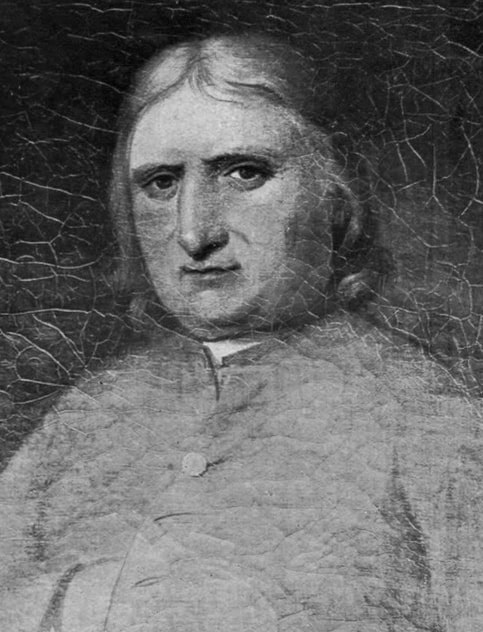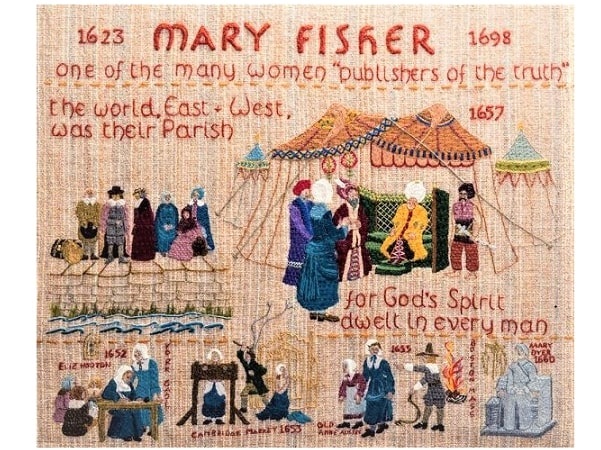Introduction: In this article, Melissa Davenport Berry continues to explore Colonial America by writing about the first two Quakers (Ann Austin and Mary Fisher) to arrive at the Massachusetts Bay Colony. Melissa is a genealogist who has a blog, AnceStory Archives, and a Facebook group, New England Family Genealogy and History.
“Why was it that the coming of two women so shook ye, as if a formidable army had invaded your borders?”
–George Bishop, “New England Be Judged”
As part of my Quaker series, today I look at some of the first Quaker missionaries to carry the message of George Fox, founder of the Religious Society of Friends, also known as Quakers.

When the Quakers came to the Colonies, they brought with them a spiritual democracy that threatened the Puritan system. Their simplistic faith had an absence of clergy, creed, and sacrament; moreover, they gave women equality.
Ann Austin and Mary Fisher, two women Quaker missionaries, arrived in Boston Harbor from the Barbados aboard the Swallow on 11 July 1656. They were the first of the Quaker faith to enter the pious Puritan Republic, and Massachusetts Bay magistrates saw them as vagabond intruders invading their borders, bent on spreading poisonous heresy like the apple Eve offered to Adam.
The threat was ominous to the “New Jerusalem,” and to the ruling elders the bowels of the Swallow harbored a host that echoed the antinomian mood of Anne Hutchinson. The authorities did not want a repeat of the same blasphemous belching they had to quell with Hutchinson in 1638.
George F. Weston’s article “Pious Puritans Were Rough with Quakers in Hub,” published in the Boston Traveler, covered how the Puritans unwelcomed some of the early disciples of Quakerism who came to America.
Weston detailed the Puritan mindset:
“The Puritans fled from England to escape persecution because of their religious beliefs. In Boston they granted religious freedom to all: one was free to subscribe to their creed or get out of the colony. Those who would not accept the Puritan form of worship and refused to leave were made to suffer.”
The Puritan response to the two women Quakers? Ann Austin and Mary Fisher:
“…were immediately arrested and held in jail until the Swallow was about to depart. Then they were hustled on board and warned never to return.”
According to sources, Deputy Governor Bellingham was convinced that the devil sent these disruptive dames “purposely to propagate their said errors and heresies.” He summoned a meeting with Deputy Governor Samuel Symonds and other local officials to exact action on this “extraordinary occasion.” (Gough, John & Sewell, William. “The History of the People Called Quakers, Volume 1.”)
The Cincinnati Commercial Tribune reported on the skinny.
The poet John Greenleaf Whittier, himself a Quaker, defended the Religious Society of Friends in a letter quoted in this article, including this paragraph:
“The charge of ‘indecency’ comes with ill grace from the authorities of the Massachusetts colony. The first Quakers who arrived in Boston, Ann Austin and Mary Fisher, were arrested on board the ship before landing, their books taken from them and burned by the constable, and they themselves brought before Deputy Governor Bellingham, in the absence of Endicott. This astute magistrate ordered them to be stripped naked, and their bodies to be carefully examined, to see if there was not the devil’s mark on them as witches. They were then sent to the jail, their cell window was boarded up, and they were left without food or light, until the master of the vessel that brought them was ordered to take them to Barbados. When [Governor John] Endicott returned, he thought they had been treated too leniently, and declared that he would have had them whipped.”
Prior to their arrival in America, Austin and Fisher had both been imprisoned in England and were aware of the punishment they might face in the Massachusetts Bay Colony. Both knew the pain of the whip and the confines of a cell, but this did not frighten them – they were fueled by a calling from on high.
Stay tuned for more…
Note: Just as an online collection of newspapers, such as GenealogyBank’s Historical Newspaper Archives, helped tell the stories of the Puritans and the Quakers, they can tell you stories about your ancestors that can’t be found anywhere else. Come look today and see what you can discover!
Additional Note: The header image for this article is a Quaker tapestry devoted to Mary Fisher. Courtesy of Patheos.com from “Great Quaker Women: Mary Fisher, Jailed Repeatedly for Preaching.”
Related Articles:
- Persecuted Quakers in Colonial America
- Persecuted Quakers in Colonial America, Part II
- Persecuted Quakers in Colonial America, Part III
